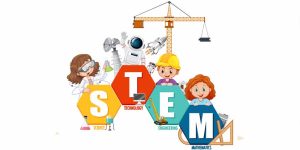Foundations For a Happy, Healthy Child: Cognitive, Physical, and Emotional Developments

Early childhood is a crucial time of development in children. Cognitive, physical, and emotional development in their early years will determine their happiness, success, well-being, and emotional stability in the future. As a parent, knowledge of social development in early childhood will help you nurture your child into a happy, healthy individual.
Cognitive Development
Cognitive development enhances thinking, memory, learning, and problem-solving abilities in a child. When developed at a young age, these abilities become ingrained into their personalities, setting them up for success in the future. Try some of the following ideas to help nurture these abilities in your child:
- Interactive Play: Games like puzzles, building blocks and other activities encourage a child to engage with different kinds of stimuli. This helps improve problem-solving abilities and promotes cognitive growth in children.
- Reading and Storytelling: Exposure to listening to stories and reading books not only helps to develop language abilities, but also broadens vocabulary and promotes curiosity.
- Educational Apps: Digital educational apps combine learning and fun in an interesting format. In particular, these digital tools are excellent in making subjects like science, maths, and language enjoyable.
Physical Development
Early childhood is when children experience a growth spurt where their brains, muscles and senses begin to rapidly develop. In particular, the development of gross motor abilities during this time will help children be active. This will ultimately lead to a healthy lifestyle in the future. Take a look at some of these activities to promote physical development in children:
- Outdoor Play: Sports, jogging, and leaping all contribute to the development of strong bones and muscles, and enhance balance and coordination. Playing outside also offers excellent opportunities for social development in early childhood, as kids explore playing with each other and in larger groups.
- Planned Physical Education: Physical education in kindergarten and schools is vital. These classes introduce children to a range of physical activities – from basic movements to exercises and sports. Children who take such lessons learn the value of physical fitness, which is an excellent habit to form at an early age.
- Healthy Diets: Nutrition is essential for the body to grow and develop in a healthy manner. A balanced diet that includes fruits, vegetables, proteins, and whole grains will improve energy levels and promote better physical development.
Emotional Development
Children become aware of emotions during early childhood, but don’t necessarily know how to process them. Understanding what feelings and emotions are, and how to manage one’s own emotions is essential for social emotional development. It is important for a child’s own well-being, and for creating healthy relationships in the future. Here are some tips on how to encourage emotional development:
- Emotion Identification and Expression: It is vital for kids to learn how to identify and communicate their feelings. The is one tool that may help in teaching children how to recognise and understand their emotions.
- A Supportive Environment: A safe and loving environment where children may express their emotions without fear is essential to Emotional Development. This can be created by encouraging children to talk about how they are feeling, and praising them for their efforts. This will increase their confidence to express themselves, and cultivate the ability to also accept other’s emotions and feelings.
Social-Emotional Development
While Emotional Development is the ability to understand and be comfortable with one’s own emotions, Social-emotional development involves learning to interact and build relationships with others. This fundamental ability must be developed for young children to be able to participate and thrive in a diverse, multi-cultural society. As parents, you can help your child’s Social-emotional development in the following ways:
- Increase Social Interactions: Peer interactions help to foster unity, compassion, and the ability to solve problems in group activities. Young children who have opportunities to engage in social interactions usually find it easier to make friends, and navigate complex group dynamics.
- Plan Group Activities: Participating in group activities at school and on the playground help build a healthy respect for the views of others. This in turn promotes teamwork and collaboration. Organise and lead group activities such as team sports, school projects, or local events to get your child involved in group experiences.
- Encourage Role-Playing: Role-playing games based on real-life events will inspire children to see things from different points of view. This in turn builds their abilities to interact and empathise with their peers. It is also a great way for parents to see how their children interpret things around them, how they think, and what they perceive.
The Importance of Early Childhood Development Education
Early Childhood Development education is absolutely vital for parents of toddlers and young children. It forms the very foundation of a child’s health and well-being, and plays an important role in defining their futures.
- Better Academic Results: Children who have healthy cognitive, physical and emotional development are more likely to gain skills that will lead to academic success.
- Social Skills: Children who have strong Social-Emotional development in early childhood are more likely to navigate social situations better. They are more likely to learn to share, cooperate, and attain problem-solving skills that are vital for life in the 21st Century.
- Emotional Resilience: Children who are exposed to social development in early childhood often have stronger emotional resilience. They learn skills in stress management, emotional control and confidence.
Integrated Holistic Development
Early childhood development is essential for a growing child. However, developments cannot happen in isolation – each is strongly connected to, and depends on the other. For children to develop holistically, parents need to adopt integrated strategies that combine cognitive, physical, and emotional growth.
Attending a school with a strong focus on holistic development will also help boost these efforts, and immerse the child in an environment designed to nurture them into happy, healthy individuals. Schools that are committed to holistic development in children often share similar characteristics. Some of these include:
- Play-Based Learning: Curriculums that are designed to mix play and educational activities to enhance student enjoyment, learning and effectiveness.
- Movement and Mindfulness: Physical activities and mind games are integrated into daily school routines. These help develop motor skills and enhance mental well-being.
- Arts and Creativity: A focus on theatre, music, and arts and crafts to help improve cognitive and emotional development.
- Qualified Teachers: Skilled teachers who understand the importance of cognitive development, and are able to customise their lesson plans to fit the needs of each student.
- Parental Involvement: Schools committed to holistic early child development understand the importance of including parents in early childhood education. Typically, these schools will ensure that parents play a supportive and nurturing role in their child’s education and development.
Every parent works tirelessly to ensure that their child grows up to be happy and healthy. Creating a healthy environment where your child can flourish is not always easy, but with the right help and support, it is possible.
At Billabong High International School, we believe in creating the right atmosphere for children to thrive. Our early childhood education focuses on holistic integrated development, enabling children to learn and grow into the best versions of themselves. To learn more about our approach to early childhood education, visit our website, or contract our admissions office.








